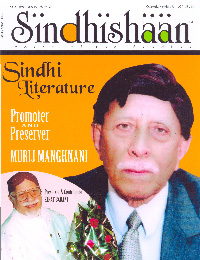![]()
SHAH ABDUL LATIF’S ROMANCE
A Review of Padmashree Dr. Motilal Jotwani’s “Shah Abdul Latif”
By Aruna Jethwani

It was by sheer chance that I discovered Dr. Motilal Jotwani's Shah Abdul Latif – the mystic Sufi poet of Sindh. I was searching for matter on Wai and no one around me had any clue to it. Wai is a unique form of philosophical verse adopted by Shah Abdul Latif in his Risalo. My visit to Banni in Kutch and a meeting with Wai Singers there whetted my appetite for Wai. It is then that a kind hearted soul put the book into my hands. The book was full of surprises, the first being its publisher – Department of Culture, Government of Sindh, Pakistan! The second surprise was its foreword written by Professor R. K. Dasgupta of Delhi University. The third surprise was its purpose “to give Shah Abdul Latif a rightful place in the mainstream of Indian Philosophic thought, aesthetic values and poetic form.” The author therefore has endeavored to bring out a spiritual concept of oneness in the Sufi Saint poetry, which was regarded till recently Islamic and Mystical.
The book merits the romance of Shah Abdul Latif's life in the delicate way, weaving it with the background of the historical turbulence and terrorism of those times. The romantic story, which captures our hearts and souls, is historically authenticated. As one reads the life of Latif, one learns of the life of mystics during the time of Aurangzeb, and at once realizes the balancing forces of spirituality against the atrocities inflicted by the rulers.
The book Shah Abdul Latif is not only an interpretation of history; it is also the poetic pathos of pain of a man who loved deeply – a woman, a family, a community and of course god the Beloved.
The book brings out the uniqueness of Indian Sufism in Shah Jo Risalo. Shah Abdul Latif takes the form of a lover (woman) yearning for her beloved (man). Marvi for Ummar, Susui for Puno, and Mumal for Rano.
The Islamic Sufism follows the reverse pattern. This perhaps is the reason why an eminent Sufi like Shah Abdul Latif does not find any mention in the books on Sufism.
For example,
Susui wails: my eyes are parched with pain.
Oh Beloved for a glance of thee
Shah Abdul Latif's poetry is practical as it glorifies the love of man for humanity and depicts the union of the High and the seemingly Low e.g. Jam and Nuri. The mystic union shown in the various Surs are more Vedantic in nature. Perhaps this is the biggest contribution of the book which has brought out in great length the Vedantic Sufism.
As I turn inwards and conversed with my soul,
There was no mountain to surpass
And no Punho to care for
I myself became Punho
Only while Susui did I experience grief.
Or to quote Dr. Jotwani, Marvi achieves union with Umar:
Before God created universe, saying “be”
And we were not yet separated from him
My relationship began there and then
Oh my beloved, I still hold this cognition in me!
The Shah Jo Risalo gives the message of peace and this is also well brought out in the book:
The Yogis became again the whole, their only concern,
Whose seat is nothingness; I cannot live without them,
Shah Abdul Latif, his life and work, by Padamshree Dr. Motilal Jotwani is a slim volume of 166 pages. It is a rich treasure, a noble gift to the Sindhi Community: Its language of alliteration, the folk music basis, the various form of Doha including Wai, the various emotions, the Bhakti and the Vedanta. The few verses of Shah translated into English are excellent and deserve Kudos.


